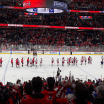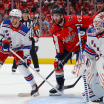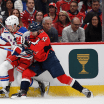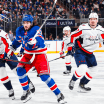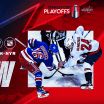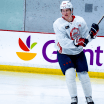On Tuesday night in Florida, the Caps will be in an unfamiliar position for the first time in a decade when they take on the Panthers in Game 1 of their first-round Stanley Cup Playoff series. This year marks the first time since 2012 that the Caps haven't opened the postseason on home ice, and given their respective home and road records during the 2021-22 regular season, opening on the road and potentially playing as many as four games of a best-of-seven set away from the District might not be a bad thing.
Caps Take On Cats as Underdogs
Caps look to use experience and sting of recent first-round exits to overcome Presidents' Trophy-winning Panthers in opening round of Cup playoffs
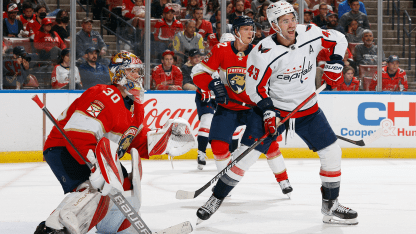
A decade ago, the Caps opened a first-round series in Boston against the defending Stanley Cup champion Bruins. Despite starting a rookie goaltender named Braden Holtby who had no previous playoff experience, the Caps were able to dethrone the Bruins in a taut seven-game set in which every game was decided by a single goal, four of them in overtime.
Despite being the seventh seed in the East that spring, the Caps came up one game shy of making it to the Eastern Conference final.
This spring, the Caps go into the postseason as the eighth seed, and they draw the Presidents' Trophy winning Panthers in the first round. Florida had a historic 122-point season, reaching the century mark in points for just the second time in franchise history, and making the postseason for the third straight time, a first in franchise history.
Florida features a prolific and diverse offensive attack that led the NHL with an average of 4.11 goals per game this season, the first team to put up more than four goals per game since Pittsburgh poured pucks home at a rate of 4.41 per game in 1995-96. The last time the Caps visited here, they got a first-hand taste of that Florida firepower when the Cats scored four goals on 27 shots in the third period alone, erasing what had been a 4-1 Washington lead at the start of the third. Florida won 5-4, in regulation.
"It's obviously a great team we're facing and it should be a good challenge for us," says Backstrom. "But I think at this time of year, we really need to focus on playing good defensively. That's where you're going to win games, and especially against this team, too. And you've got to be disciplined and make sure we're doing great out there for 60 minutes."
The Caps have plenty of respect for the Panthers and what they've accomplished this season, and they fully realize they're the underdog in this series. But they're also confident in their own game and abilities, and still stinging from recent postseason setbacks. They're not planning on rolling over and playing dead against the League's best regular season team, they've been there before, and they know the pressure that comes with winning the Presidents' Trophy.
"I don't think the pressure is really the factor," says Caps right wing T. J. Oshie. "It's kind of how you play down the stretch. When we won the Presidents' Trophy those two years in a row, one year we were way ahead and we kind of just coasted into the playoffs. And the playoffs came, and we got through the first round. And then after that, Pittsburgh was playing really good hockey and we went home early.
"It all comes down to how you're playing, I think, starting Game 1 there. And whether you're at 120 points or 100, the slate gets wiped pretty clean. You'd have to ask them how they're feeling about that, but as far as we're concerned, we're ready to rock and the points in the regular season don't matter."
Florida is younger and faster, and the Cats can pack their lineup with skill. One area where Washington has a decided advantage is in experience. But can the Caps' experience overcome everything else the Panthers bring to the table? Starting Tuesday night, we'll find out.
"I think experience gives us a little bit of an advantage against them," says Caps captain Alex Ovechkin. "But like everybody knows, playoffs is a totally different game and a new season. I think you just have to play simple and smart and don't get frustrated, because we've been in this position when we won the Presidents' Trophy and all that kind of stuff. But when it got to playoffs, it gave us trouble to try to play the right way."
Washington won its first Presidents' Trophy in 2009-10, piling up 121 points. The '09-10 Caps drew Montreal in the first round of the playoffs, an 88-point team that squeaked past the Rangers for the final playoff berth in the Eastern Conference. But when the first-round series against the Habs started, the Caps were in the soup from the start.
They lost Game 1 at home, and they needed a late John Carlson goal - the first playoff goal of his career - late in regulation to force overtime in Game 2, avoiding going to Montreal in a 0-2 series hole. Nicklas Backstrom scored the game-winner in overtime that night - filling out a playoff hat trick - and the Caps went on to take a 3-1 lead in the series, only to fall to the Habs and Jaroslav Halak in seven games, a bitterly disappointing outcome for a still up-and-coming Washington team at the time.
In the dozen years since then, the Caps have had a number of postseason highs and lows, none higher than winning the Cup in 2018 and few lower than falling to the Habs in the first round in 2010. Now, they've come full circle. They're the eighth seed looking to knock off the League's regular season champs, and they're believing that their previous body of work in the postseason - both good and bad - can help them get by the Panthers.
Although they're the eighth seed this spring, the Caps are one of eight teams with 100 or more points on the Eastern Conference side of the postseason table, the first time in League history that one conference has produced eight 100-point teams. And although Washington enters the postseason with uncertainty at the game's most important position - goaltender - they're not alone in that regard.
Tampa Bay's Andrej Vaslievskiy has 76 career postseason victories, with 32 of those accumulated in successive Stanley Cup runs following the last two seasons. If you take the other 14 goaltenders on the other seven Eastern Conference playoff teams, the 14 of them combined don't have 76 playoff wins, and Washington is - along with Boston and the New York Rangers - one of three teams without any Stanley Cup victories among the goaltenders on its roster.
Florida features 12-year veteran Sergei Bobrovsky in net. The 33-year-old Bobrovsky carries an annual salary cap hit of $10 million, the second-highest cap hit of any goalie in the NHL. In eight previous postseasons - including seven as a starter and No. 1 netminder - he has won 13 games (in 36 starts) and one series. That lone series win came in 2019 when Bobrovsky backstopped the eighth-seeded Columbus Blue Jackets to a stunning sweep of the Presidents' Trophy-winning Tampa Bay Lightning in the first round.
There was considerably less pressure on Bobrovsky in 2019; he was the goaltender for a team that finished the season with 30 fewer points than its first-round opponent, and he hadn't yet signed his seven-year, $70-million contract to come to Florida.
When the Caps won the Cup in 2018, they disposed of Bobrovsky and the Jackets in six games in the first round, and he is sub-.500 lifetime against Washington in the regular season as well. The Caps' biggest challenges in this series will be keeping the Panthers in check offensively, keeping momentum on their side as much as possible, and playing with the puck as much as possible.
How can experience help Washington overcome a favored foe? We put the question to some of the Caps who've hoisted the Cup, and some who have been with the team through its three consecutive first-round exits since then.
"I think it's important how we're going to play," says defenseman Dmitry Orlov. "I think if we're going to bring our game like against Colorado [on April 18 in Denver], that was playoff game from both sides. There was hard battle for every puck. We blocked shots, we were competing for each other. We still make some plays because we need to, and if not, we just make simple play and try to get the puck back. That's important, because it's not a pretty game in the playoffs.
"Guys who don't hit are going to hit and you have to expect work from everyone, all four lines. When we won the Cup, it was all four lines going and we need that same thing. We need that same attitude in these playoffs. Every game is going to be not easy and every game is different, so it's important to come prepared for the game and how we're going to be in conditioning. And it's important too to find the ways to recover from maybe overtime games. It is going to be interesting and how we're going to handle some things."
Lars Eller scored a couple of the biggest goals in franchise history in 2018, the game-winner in overtime in Game 3 against Columbus (and Bobrovsky) and the game-winner in the Cup-clinching contest against Vegas.
"Just knowing that things are going to go back and forth within a game and within a series, you can't think too far ahead," says Eller. "You have to just be in the moment and trying to hold on to the momentum as long as you can, and the quicker you get it back when it swings in the other team's favor. And just not panicking and knowing that it's a long series. I don't think you can underestimate that.
"So if you haven't been there before, I think this is going to help us. I also just think that we have a team that can play the game, whatever game is presented. We can play a skill game or a heavy game. We have a lot of depth. It really seems like we're a team where all four lines contribute. I think that's a winning formula for a team that's going to have success in the playoffs."
Tom Wilson's coming out party as a fixture in the team's top six started in the run up to the playoffs in 2017-18, and he's been firmly ensconced there since.
"Come playoff time, anything can happen," says Wilson. "It doesn't really matter where you finish and everybody will probably tell you that, no matter where you slot in the standings. But sometimes it's nice being the underdogs. You can go in there and make some noise and give it your best effort. Every Eastern playoff team is pretty solid, but we've got to be just feeling good about our game because every team will be a good challenge, and I think we're up for it. I think we're hungry for it. We haven't been where we want to be the last couple of years, so we've got to win some playoff games this year, and we've got to have that mentality moving forward.
"I think experience is one of those things that is huge. Every little thing matters in the postseason, and when you've been through it, you know how to handle that stuff. Even the day to day; how you're treating your body, how you wake up, how you practice, and ups and downs throughout a game. There's a lot of momentum swings in the playoffs. There's a lot of distractions, a lot of extra noise. There's a million things that go into a successful postseason run, and having experience to fall back on and a successful group blueprint can always help, and it just lets you focus on your game. Having been through it before, it's always helpful to be able to fall back on that."
Although Ovechkin won the Conn Smythe Trophy as the most valuable player in the postseason in 2018, Evgeny Kuznetsov could have also taken home the hardware. He led all NHL players with 20 assists and 32 points in 24 games that spring.
"So I'm a believer to luck, right?" says Kuznetsov. "If we can do a couple of good plays, get the momentum and then we can drive from that. But if we are going to give them momentum, they're going to be on an attack all the time, and it's going to be hard. So for us, it's very important to play our game and really, really, really enjoy it every day.
"We are the type of team that feeds off energy. We need the positive good energy, and first couple shifts obviously are good examples. Guys feed [off] and pick up that stuff, and they play better. That's to me what I want from the experience. When you're experienced, you know that there is so many guys inside the team that are going to feed off your first or second shift. So it's very important for us experienced guys - if you can say that - to have a couple of good shifts, so the rest of the guys could pick it up."
With four game-winning overtime goals in the playoffs, Backstrom holds the franchise record. He has been a big game player since entering the NHL in 2007-08, and he will be playing in the postseason for the 14th time in his 15 NHL seasons.
"We're obviously playing a team with a better record than us, but at the same time you want to see that as a challenge for us as a group," Backstrom declares. "It's going to be a great challenge for us, and with our experience we've got to make sure that we play a tight game out there, because playoffs is all about playing both ways.
"It's a lot of ups and downs to the playoffs. And also there's a small margin too, so anything that happened you just got to stick with it. You've just got to keep playing, because everything matters. Just mentally, we've got to be ready."
Carlson has played more games (117) and has scored more goals (18), recorded more assists (50) and points (68) than any other defenseman in franchise history. He made his playoff debut with Washington in that ill-fated Montreal series in 2010.
"You can be fast in a multitude of different ways, and we certainly have a lot of different facets of fast," says Carlson. "The more we take care of the puck, the better. The puck moves faster than any person can skate in here. So if we take care of it and get to moving the puck up the ice, speed doesn't matter as much when you can execute. And certainly when you don't execute, then it doesn't matter either, I guess. No one is going to win a game - no matter how fast you are - if you're not executing.
"For us, we look like a really fast team when we're making the plays, we're coming up the ice together with options, and guys can always find the right option in that sense, and we're flying up and down the ice."
After recorded five goals and nine points in his first 30 Stanley Cup Playoff games with St. Louis, Oshie has flourished in the postseason with Washington with 23 goals and 52 points in 66 games, including eight goals and 21 points in 24 games when the Caps lifted the Cup in 2018.
"I think there is a point where you either just play the same way and fall into the same early summers, and that's just kind of your game," says Oshie. "Or you get sick of it, and everyone started tugging the rope their fair share and doing things the right way. And there's a lot that goes into winning the Cup down the road, as far as goaltending, injuries, calls, post-and-in instead of post-and-out, that kind of stuff.
"But as far as the mentality of the team, I think we've started to shift and I can feel some of that same confidence we had in 2018. I can see a little bit of that coming out right now. We've just got to keep playing our game, no matter what the score no matter who the opponent is. In a seven-game series, if we play our game longer that's the difference between winning and losing."
Nic Dowd made his playoff debut with the Capitals in 2019, scoring the first penalty shot goal in Washington's postseason history against Carolina. Last spring, he netted the overtime game-winner in Game 1 against Boston, the Caps' only win in that series.
"The biggest thing that brings is the ability to stay even keel," says Dowd. "I think for a team that hasn't doesn't have a lot of playoff experience - whoever that may be - playoffs is a long run, right? You see teams go through ups and downs, and we very rarely see a team go 16-0 where everything goes well. So the ability to have a more experienced team, I think the one big thing you can pull from that is just having the ability to understand that it has the possibility of being a long run, and good and bad things are going to happen.
"The old saying of, 'Don't get too high and don't get too low,' that probably is a big thing during playoffs because it's a game of bounces and luck, and guys have got to play well. And there's no guarantee that you're going to win games, even if you play great, right? You can run into a hot goaltender, get a couple of bad bounces or maybe a bad call, you have no clue. So the ability to understand that you can take a breath here, and there are going to be more games. We have to just perform well and turn the page."
Since winning the Cup four springs ago, the Caps have weathered three straight first-round exits for the first time since 1992-94. While some players believe that the years of accumulated frustration helped lift the team to the Cup in 2018, it's nowhere near a consensus. But all believe the Caps can similarly draw motivation from three successive first-round departures.
"Those previous years when we won Presidents' Trophy, I don't think that lots of guys understand their role on the team," says Ovechkin. "And when we won the Cup, I think all four lines understand their role. And even with suspension of guys getting hurt, players who jump in on the line, they know their role as well, so they have to be ready for anything. And how I said, everything was clicking perfectly for us that year, and I'm pretty sure that right now guys have to understand that, okay, this is a family here. It's not about personal stats, it's not about the goals, and it's not about a situation where you say, 'I have to do more than I can.' No, you have to mentally say, 'My job today is to block this shot, don't give that guy confidence and don't give that guy time and space.' I think we all understand what we have to do, and we all have to be working."
"Yeah, we should, no doubt," says Orlov. "You get older and still you want to win and you're still hungry. And that's the most important thing. I think if you're not hungry, you are not motivated and it's no point to play hockey anymore. You have to be enjoyable at the same time, and you have to work hard, because in this league, it's not easy to be able to play and especially to win. So, yeah, we should. Everyone should bring hands on the rope and keep pushing it."
"The first thing that I think to myself is that I'm not losing in the first round again," says Dowd. "And I don't walk into a series thinking that as my mentality, but it's definitely something that is disappointing in the past since I've been here, especially when we've had such good teams. And I know everyone else was disappointed in that too. I think we've left the playoffs ever since I've been here with a really sour taste in our mouth every year. That's including going back all the way to the bubble. And I think there's a lot of guys in here that are excited to get this opportunity to play well, in this first round."
"Yeah, absolutely," says Backstrom. "It's never a good thing to lose in the first round. And I feel like in those years we've had better teams that should have gone further. But for us as a team, we're still hungry, we want to win, we want to be good out there. I think it's just about being mentally focused and being ready for the playoffs."
"Yeah, absolutely," says Carlson. "After every season, you kind of weigh everything and think about it and go back on it, and obviously if it doesn't end the way you want, you're not building off of that and then you build off of something else, and it's the failure and the heartbreak. The ultimate prize is always going to be the same thing, and the way you motivate that sort of thing is fuel. We know what it's like to do both, and one of them feels a hell of a lot different than the other. So yeah, I think you draw on those failures. You remember that sting and all that, not that think we need more motivation, but it definitely helps."
"I'd like to think that we can," says Eller. "The majority of the players here - the core - we have been through those times, we have been through winning, we have been through so many disappointments of losses in different rounds. And I'd like to think that we are still very hungry to win. We are, I have no doubt about that. But we have to play, and we have to be more than the other team we're playing against. And also, it's never really proven to be an advantage to be the favorite going into a series, and I don't feel like we have pressure on us, other than the pressure we put on ourselves. And at this point with the experience we have, handling the pressure is easier than it was five years ago, or four years ago."
"I'm a believer in a short memory," says Kuznetsov. "I like to start from scratch, and I really believe that it doesn't matter how good or bad you played during the season. You may score a couple of goals or have a [crappy] year, but if you perform in the playoffs, people - coaches, everybody - are going to forget how good you've been or bad you've been during the season. So the pressure is back and we have to prove that we are still a good team and we are still in that category of a team that can play when we need it."
"Looking back on the last couple years, we've had the opportunity to advance," says Wilson. "There's little moments during the series that you look back on, you wish you could change and often sometimes those things control the outcome. It's a little frustrating.
"Against Carolina, we had a couple of games where you just wish you put your foot down, and that's why it's tough to win. And then against Boston, there's times where we're looking pretty good early on in the series and they get a couple bounces and then you're trailing. So just trying to stay as even keel as you can and controlling the little things, and just being focused and hungry going in come puck drop Game One I think will be really important. And then whatever happens from there, just staying together as a group and trying to have each other's backs through the ups and downs.
"I'm excited to get back to this time of year, because this is the fun hockey, and like I said nowadays every team is good. It's an exciting time of year."







